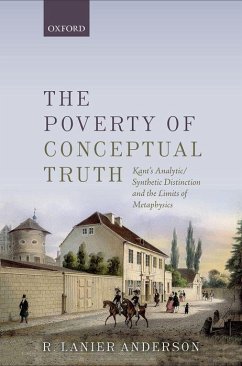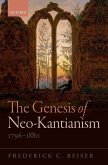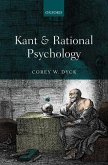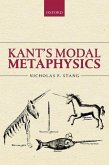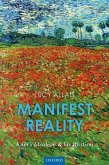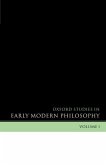R Lanier Anderson
Poverty of Conceptual Truth
Kant's Analytic/Synthetic Distinction and the Limits of Metaphysics
R Lanier Anderson
Poverty of Conceptual Truth
Kant's Analytic/Synthetic Distinction and the Limits of Metaphysics
- Gebundenes Buch
- Merkliste
- Auf die Merkliste
- Bewerten Bewerten
- Teilen
- Produkt teilen
- Produkterinnerung
- Produkterinnerung
R. Lanier Anderson presents a new account of Kant's distinction between analytic and synthetic judgments, and provides it with a clear basis within traditional logic. He reconstructs compelling claims about the syntheticity of elementary mathematics, and re-animates Kant's arguments against traditional metaphysics in the Critique of Pure Reason.
Andere Kunden interessierten sich auch für
![Honoré Fabri and the Concept of Impetus: A Bridge between Conceptual Frameworks Honoré Fabri and the Concept of Impetus: A Bridge between Conceptual Frameworks]() Michael ElazarHonoré Fabri and the Concept of Impetus: A Bridge between Conceptual Frameworks75,99 €
Michael ElazarHonoré Fabri and the Concept of Impetus: A Bridge between Conceptual Frameworks75,99 €![Genesis of Neo-Kantianism, 1796-1880 Genesis of Neo-Kantianism, 1796-1880]() Frederick C BeiserGenesis of Neo-Kantianism, 1796-1880198,99 €
Frederick C BeiserGenesis of Neo-Kantianism, 1796-1880198,99 €![Kant and Rational Psychology Kant and Rational Psychology]() Corey W DyckKant and Rational Psychology113,99 €
Corey W DyckKant and Rational Psychology113,99 €![Kant's Modal Metaphysics C Kant's Modal Metaphysics C]() StangKant's Modal Metaphysics C102,99 €
StangKant's Modal Metaphysics C102,99 €![Manifest Reality Manifest Reality]() Lucy AllaisManifest Reality102,99 €
Lucy AllaisManifest Reality102,99 €![The Prince The Prince]() Niccolo MachiavelliThe Prince4,99 €
Niccolo MachiavelliThe Prince4,99 €![Oxford Studies in Early Modern Philosophy Oxford Studies in Early Modern Philosophy]() Daniel Garber / Steven Nadler (eds.)Oxford Studies in Early Modern Philosophy61,99 €
Daniel Garber / Steven Nadler (eds.)Oxford Studies in Early Modern Philosophy61,99 €-
-
-
R. Lanier Anderson presents a new account of Kant's distinction between analytic and synthetic judgments, and provides it with a clear basis within traditional logic. He reconstructs compelling claims about the syntheticity of elementary mathematics, and re-animates Kant's arguments against traditional metaphysics in the Critique of Pure Reason.
Produktdetails
- Produktdetails
- Verlag: Oxford University Press (UK)
- Seitenzahl: 428
- Erscheinungstermin: 23. März 2015
- Englisch
- Abmessung: 157mm x 236mm x 30mm
- Gewicht: 780g
- ISBN-13: 9780198724575
- ISBN-10: 0198724578
- Artikelnr.: 47869870
- Herstellerkennzeichnung
- Libri GmbH
- Europaallee 1
- 36244 Bad Hersfeld
- gpsr@libri.de
- Verlag: Oxford University Press (UK)
- Seitenzahl: 428
- Erscheinungstermin: 23. März 2015
- Englisch
- Abmessung: 157mm x 236mm x 30mm
- Gewicht: 780g
- ISBN-13: 9780198724575
- ISBN-10: 0198724578
- Artikelnr.: 47869870
- Herstellerkennzeichnung
- Libri GmbH
- Europaallee 1
- 36244 Bad Hersfeld
- gpsr@libri.de
R. Lanier Anderson is Associate Professor of Philosophy (and by courtesy, of German Studies) at Stanford University, where he currently chairs the Philosophy Department. He works in the history of late modern philosophy with primary focus on Kant and nineteenth century philosophy, and is the author of a numerous articles about Kant, Nietzsche, and the neo-Kantian movement. His other research interests include Nietzsche's moral psychology and various topics in the philosophy of Montaigne.
* Introduction
* 1: Containment Analyticity and Kant's Problem of Synthetic Judgment
* Part I--The Traditional Logic of Concept Containment and its
(alleged) Metaphysical Implications
* 2: Containment and the Traditional Logic of Concepts
* 3: The Wolffian Paradigm
* 4: Narrowness and Trade-offs: Conceptual Truth in the
'Leibnizian-Wolffian' Philosophy
* Part II--A Difficult Birth: the Emergence of Kant's
Analytic/Synthetic Distinction
* 5: Three Versions of Analyticity
* 6: Methodological Beginnings: Analysis and Synthesis in the Published
pre-Critical Works
* 7: Making Synthetic Judgments Analytic: Kant's Long Road toward
Logical Analyticity in the Reflexionen
* Part III--Ineliminable Synthetic Truth in Elementary Mathematics
* 8: The Logic of Concepts and a 'Two Step' Syntheticity Argument
* 9: Kant on the Syntheticity of Elementary Mathematics
* Part IV--The Poverty of Conceptual Truth and the Master Argument of
the 'Transcendental Dialectic'
* 10: The Master Argument
* 11: The Soul and the World: the Master Argument in Kant's
'Paralogisms' and 'Antinomy'
* 12: The Master Argument in the Critique of Rational Theology
* Epilogue
* 13: Empirical Concept Formation and the Systematic Role of Logical
Division
* Appendix 1: Kant's Criticisms of the Ontological Argument in 1763
* Four Strands of Reflexionen on the Emerging Analytic/Synthetic
Distinction
* Friedman and the Phenomenological Reading
* 1: Containment Analyticity and Kant's Problem of Synthetic Judgment
* Part I--The Traditional Logic of Concept Containment and its
(alleged) Metaphysical Implications
* 2: Containment and the Traditional Logic of Concepts
* 3: The Wolffian Paradigm
* 4: Narrowness and Trade-offs: Conceptual Truth in the
'Leibnizian-Wolffian' Philosophy
* Part II--A Difficult Birth: the Emergence of Kant's
Analytic/Synthetic Distinction
* 5: Three Versions of Analyticity
* 6: Methodological Beginnings: Analysis and Synthesis in the Published
pre-Critical Works
* 7: Making Synthetic Judgments Analytic: Kant's Long Road toward
Logical Analyticity in the Reflexionen
* Part III--Ineliminable Synthetic Truth in Elementary Mathematics
* 8: The Logic of Concepts and a 'Two Step' Syntheticity Argument
* 9: Kant on the Syntheticity of Elementary Mathematics
* Part IV--The Poverty of Conceptual Truth and the Master Argument of
the 'Transcendental Dialectic'
* 10: The Master Argument
* 11: The Soul and the World: the Master Argument in Kant's
'Paralogisms' and 'Antinomy'
* 12: The Master Argument in the Critique of Rational Theology
* Epilogue
* 13: Empirical Concept Formation and the Systematic Role of Logical
Division
* Appendix 1: Kant's Criticisms of the Ontological Argument in 1763
* Four Strands of Reflexionen on the Emerging Analytic/Synthetic
Distinction
* Friedman and the Phenomenological Reading
* Introduction
* 1: Containment Analyticity and Kant's Problem of Synthetic Judgment
* Part I--The Traditional Logic of Concept Containment and its
(alleged) Metaphysical Implications
* 2: Containment and the Traditional Logic of Concepts
* 3: The Wolffian Paradigm
* 4: Narrowness and Trade-offs: Conceptual Truth in the
'Leibnizian-Wolffian' Philosophy
* Part II--A Difficult Birth: the Emergence of Kant's
Analytic/Synthetic Distinction
* 5: Three Versions of Analyticity
* 6: Methodological Beginnings: Analysis and Synthesis in the Published
pre-Critical Works
* 7: Making Synthetic Judgments Analytic: Kant's Long Road toward
Logical Analyticity in the Reflexionen
* Part III--Ineliminable Synthetic Truth in Elementary Mathematics
* 8: The Logic of Concepts and a 'Two Step' Syntheticity Argument
* 9: Kant on the Syntheticity of Elementary Mathematics
* Part IV--The Poverty of Conceptual Truth and the Master Argument of
the 'Transcendental Dialectic'
* 10: The Master Argument
* 11: The Soul and the World: the Master Argument in Kant's
'Paralogisms' and 'Antinomy'
* 12: The Master Argument in the Critique of Rational Theology
* Epilogue
* 13: Empirical Concept Formation and the Systematic Role of Logical
Division
* Appendix 1: Kant's Criticisms of the Ontological Argument in 1763
* Four Strands of Reflexionen on the Emerging Analytic/Synthetic
Distinction
* Friedman and the Phenomenological Reading
* 1: Containment Analyticity and Kant's Problem of Synthetic Judgment
* Part I--The Traditional Logic of Concept Containment and its
(alleged) Metaphysical Implications
* 2: Containment and the Traditional Logic of Concepts
* 3: The Wolffian Paradigm
* 4: Narrowness and Trade-offs: Conceptual Truth in the
'Leibnizian-Wolffian' Philosophy
* Part II--A Difficult Birth: the Emergence of Kant's
Analytic/Synthetic Distinction
* 5: Three Versions of Analyticity
* 6: Methodological Beginnings: Analysis and Synthesis in the Published
pre-Critical Works
* 7: Making Synthetic Judgments Analytic: Kant's Long Road toward
Logical Analyticity in the Reflexionen
* Part III--Ineliminable Synthetic Truth in Elementary Mathematics
* 8: The Logic of Concepts and a 'Two Step' Syntheticity Argument
* 9: Kant on the Syntheticity of Elementary Mathematics
* Part IV--The Poverty of Conceptual Truth and the Master Argument of
the 'Transcendental Dialectic'
* 10: The Master Argument
* 11: The Soul and the World: the Master Argument in Kant's
'Paralogisms' and 'Antinomy'
* 12: The Master Argument in the Critique of Rational Theology
* Epilogue
* 13: Empirical Concept Formation and the Systematic Role of Logical
Division
* Appendix 1: Kant's Criticisms of the Ontological Argument in 1763
* Four Strands of Reflexionen on the Emerging Analytic/Synthetic
Distinction
* Friedman and the Phenomenological Reading

